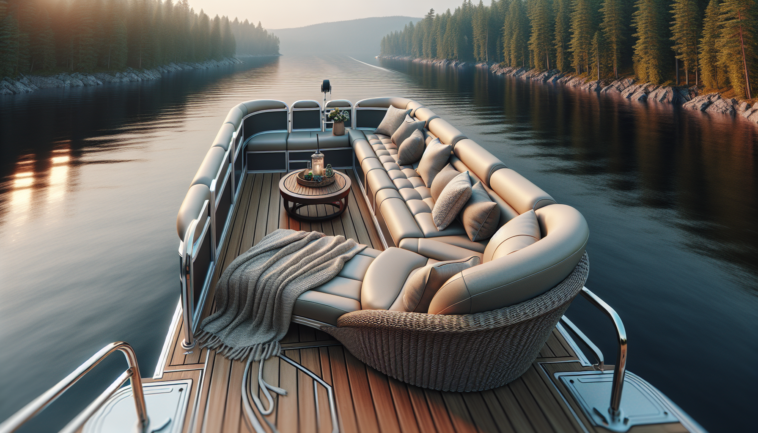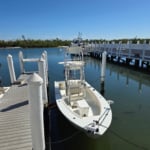Picture this: the sun is shining, the water is glistening, and you’re cruising along on a pontoon boat, enjoying the gentle breeze. But as the day heats up and it becomes harder to escape the sweltering rays, you start to wonder: is there air conditioning on pontoon boats? After all, who wouldn’t want to stay cool and comfortable while exploring the open waters? In this article, we will uncover the answer to this burning question and help you make the most of your pontoon boat experience.
Overview of pontoon boats
Pontoon boats are a popular type of recreational watercraft that are known for their stability, spaciousness, and versatility. They are commonly used for leisure activities such as fishing, cruising, and hosting gatherings on the water. Pontoon boats feature a unique design that consists of a flat platform supported by two or more pontoons, which are cylindrical flotation devices. This design allows for increased stability and buoyancy, making pontoon boats ideal for various recreational purposes.
Definition of pontoon boats
Pontoon boats, also known as party barges, are a type of watercraft that are characterized by their flat, stable deck and distinct pontoon design. They typically have a shallow draft, which means they can navigate in shallow waters without the risk of grounding. The pontoons, or flotation devices, are usually made of aluminum or fiberglass and provide buoyancy and stability to the boat. The deck of a pontoon boat can be customized with various seating arrangements, amenities, and accessories to suit the needs and preferences of the owner.
Features and design of pontoon boats
Pontoon boats are designed to provide a comfortable and enjoyable experience on the water. They often feature a spacious deck area that allows for plenty of seating and lounging options. Many pontoon boats come equipped with amenities such as built-in tables, cup holders, stereo systems, and even wet bars. The design of pontoon boats also allows for easy boarding and disembarking, as the deck is usually at the same level as the dock. Additionally, pontoon boats can be customized with various accessories such as canopies or enclosures for shade and protection from the elements.
Popular uses of pontoon boats
Pontoon boats are incredibly versatile and can be used for a variety of recreational activities. They are commonly used for leisurely cruises, fishing trips, and even as floating party platforms. With their spacious deck area, pontoon boats are perfect for hosting gatherings and socializing on the water. They also provide a stable and comfortable platform for water sports such as tubing, water skiing, and wakeboarding. Furthermore, pontoon boats can be used for camping trips and overnight stays on the water, as they can be equipped with sleeping quarters and other amenities for extended stays.

Comfort considerations on pontoon boats
When spending extended periods of time on a pontoon boat, comfort becomes a crucial factor. The open design of pontoon boats allows for ample fresh air and natural ventilation, making them comfortable even in warm weather. However, there are certain considerations to ensure optimal comfort on a pontoon boat. One of these considerations is the installation of air conditioning, which can significantly enhance the comfort level, especially during hot weather or in regions with sweltering climates.
Importance of air conditioning on pontoon boats
Air conditioning plays a vital role in ensuring a comfortable boating experience, especially when the temperatures soar. Here are some of the reasons why air conditioning is important on pontoon boats:
Comfort during hot weather
Hot and humid weather can make being on a pontoon boat uncomfortable, especially if there is no relief from the heat. Air conditioning provides a cool and refreshing environment, allowing passengers to escape the sweltering outdoor temperatures and enjoy a comfortable indoor space.
Extended boating season
With air conditioning, boating can become a year-round activity. Air conditioning enables boaters to enjoy their pontoon boats even during the hottest months or in regions with extreme climates. It extends the boating season and allows for more opportunities to spend time on the water.
Enhanced experience for passengers
Having air conditioning on a pontoon boat enhances the overall experience for passengers. It provides a comfortable and pleasant atmosphere, making the boat a more inviting place to relax, socialize, and enjoy leisure activities. Whether it’s hosting a party or simply cruising with family and friends, air conditioning adds a touch of luxury and convenience to the boating experience.
Protection of electronic equipment
Electronics such as sound systems, navigation equipment, and other onboard devices are susceptible to damage from heat and humidity. Air conditioning helps regulate the temperature and humidity levels inside the boat, ensuring the longevity and proper functioning of electronic equipment. It offers protection against potential damage caused by excessive heat or moisture.
Types of air conditioning for pontoon boats
There are two primary types of air conditioning systems that can be used on pontoon boats: marine air conditioning systems and portable air conditioners.
Marine air conditioning systems
Marine air conditioning systems are specifically designed for use on boats and other watercraft. These systems are typically installed permanently and are integrated into the boat’s electrical and plumbing systems. Marine air conditioning systems use seawater or a separate cooling system to remove heat from the air and circulate cool air throughout the boat’s interior. They provide efficient and reliable cooling performance and are available in various sizes and capacities to accommodate different boat sizes and layouts.
Portable air conditioners
Portable air conditioners offer a more flexible and versatile cooling solution for pontoon boats. These units are standalone and do not require permanent installation. Portable air conditioners can be placed anywhere on the boat, allowing for customizable cooling in specific areas or compartments. They typically use a hose to exhaust hot air outside of the boat and require a power source to operate. Portable air conditioners offer the advantage of mobility, as they can be used on different boats or even brought ashore for other uses.
Marine air conditioning systems
Understanding marine air conditioning is essential when considering this option for your pontoon boat. Marine air conditioning systems are specifically designed and engineered to withstand the challenges of a marine environment.
Components and installation
Marine air conditioning systems consist of several components, including a compressor, condenser, evaporator, and air handler. These components work together to cool the air and distribute it throughout the boat’s interior. The installation of marine air conditioning systems requires the expertise of professionals who can ensure proper sizing, positioning, and integration with the boat’s electrical and plumbing systems. It is important to hire qualified technicians who are familiar with marine air conditioning systems to ensure a successful installation.
Advantages and disadvantages
One of the advantages of marine air conditioning systems is their efficiency and reliability. These systems are specifically designed to withstand the harsh marine environment, including exposure to saltwater, humidity, and vibrations. Marine air conditioning systems are also usually more powerful than portable units, providing efficient cooling performance even in larger boats. However, one disadvantage of marine air conditioning systems is the initial cost and complexity of installation. They require professional installation and may involve modifications to the boat’s electrical and plumbing systems.
Maintenance and upkeep
Proper maintenance is important to ensure the longevity and optimal performance of marine air conditioning systems. Regular maintenance tasks may include cleaning or replacing air filters, checking and cleaning condenser coils, inspecting and tightening electrical connections, and monitoring refrigerant levels. Additionally, it is recommended to have the system professionally serviced at least once a year to address any potential issues and ensure its continued efficiency.
Portable air conditioners for pontoon boats
Portable air conditioners offer a convenient cooling solution for pontoon boats. These units are versatile and easy to install, making them an attractive option for boat owners who may want to use the air conditioner on different boats or in other applications.
Benefits of portable air conditioners
One of the primary benefits of portable air conditioners is their portability and flexibility. These units do not require permanent installation and can be easily moved and placed anywhere on the boat. Furthermore, portable air conditioners are typically more affordable compared to marine air conditioning systems, making them a cost-effective option for boaters. They also offer the advantage of being able to cool specific areas or compartments, allowing for customized cooling preferences.
Installation and setup
Installing a portable air conditioner on a pontoon boat is relatively straightforward. The unit needs to be placed in a suitable location with access to a power source and ventilation for exhaust hose installation. The exhaust hose should be properly routed outside the boat to ensure the hot air is expelled. Depending on the size and cooling capacity of the portable air conditioner, it may require a dedicated power source or run off the boat’s electrical system. When installing a portable air conditioner, it is important to follow the manufacturer’s instructions and ensure proper ventilation to avoid overheating.
Operational considerations
Portable air conditioners require a power source to operate, so it is essential to consider the electrical capacity and capabilities of the boat. The size and cooling capacity of the unit should also be selected based on the boat’s size and the desired cooling area. It is important to note that portable air conditioners may not provide the same level of cooling performance as marine air conditioning systems, especially in larger boats or in exceptionally hot weather conditions. Additionally, portable air conditioners require regular maintenance, including cleaning or replacing air filters and ensuring proper ventilation and hose connections.
Limitations and drawbacks
While portable air conditioners offer convenience and affordability, there are some limitations and drawbacks to consider. These units can take up space on the deck or in the cabin, which may be a consideration for boats with limited space. Portable air conditioners also require a power source to operate, and their cooling capacity may be limited compared to marine air conditioning systems. Additionally, do-it-yourself installation may not be suitable for everyone, and professional assistance may be required for routing and venting the exhaust hose properly.
Factors to consider when choosing air conditioning for pontoon boats
When choosing air conditioning for pontoon boats, several factors should be considered to ensure the right system is selected for your specific needs and preferences.
Boat size and layout
The size and layout of your pontoon boat play a significant role in determining the type of air conditioning system that will work best. Larger boats may require marine air conditioning systems with higher cooling capacities, while smaller boats may benefit from portable air conditioners that can be positioned in specific areas. Consider the available space on your boat and the potential locations for installing and operating an air conditioning unit.
Power requirements
Air conditioning systems, whether marine or portable, require a power source to operate. It is essential to assess the electrical capacity and capabilities of your boat to determine if it can support the power requirements of the chosen air conditioning system. Marine air conditioning systems usually require dedicated electrical circuits and may need modifications to the boat’s electrical system, while portable air conditioners can run off the boat’s existing electrical outlets or require a separate power source.
Budget considerations
The cost of air conditioning systems can vary significantly depending on the type, size, and brand. Marine air conditioning systems are generally more expensive, considering the initial installation costs and potential modifications required. Portable air conditioners are typically more affordable but may have limitations in terms of cooling capacity and convenience. Evaluate your budget and consider the long-term cost of installing and maintaining the chosen air conditioning system.
Climate and boating location
Consider the climate and boating location when selecting air conditioning for your pontoon boat. If you frequently boat in hot and humid regions, it may be necessary to invest in a more powerful and efficient cooling system. Likewise, if you intend to use your pontoon boat year-round, a marine air conditioning system may be a better option for consistent and reliable cooling. Assess the environmental conditions and temperature ranges you are likely to encounter to ensure the chosen air conditioning system can adequately meet your needs.
Installation and maintenance
Once you have selected the appropriate air conditioning system for your pontoon boat, proper installation and maintenance are essential to ensure optimal performance and longevity.
Professional installation services
For marine air conditioning systems, it is highly recommended to enlist the services of professionals for installation. Qualified technicians familiar with marine air conditioning systems can ensure proper sizing, positioning, and integration with your boat’s electrical and plumbing systems. Professional installation also ensures compliance with safety standards and reduces the risk of damage or malfunction.
DIY installation guidelines
Portable air conditioners offer a more straightforward installation process that can be tackled by boat owners with basic DIY skills. When installing a portable air conditioner, carefully follow the manufacturer’s instructions and guidelines. Ensure proper positioning, ventilation, and electrical connections, and avoid any potential hazards or safety risks. If you are unsure or have any doubts about the installation process, consult with professionals to ensure a safe and successful installation.
Routine maintenance practices
Regular maintenance is necessary to keep your pontoon boat’s air conditioning system in optimal condition. For marine air conditioning systems, follow the manufacturer’s recommended maintenance schedule and procedures. This may include tasks such as cleaning or replacing air filters, inspecting and cleaning condenser coils, monitoring refrigerant levels, and checking electrical connections. Portable air conditioners also require routine maintenance, including cleaning or replacing air filters, ensuring proper ventilation, and verifying hose connections.
Troubleshooting common issues
In case of any issues or difficulties with your pontoon boat’s air conditioning system, it is helpful to familiarize yourself with common troubleshooting techniques. Understanding the basic components and functionality of the system can aid in identifying potential problems and finding suitable solutions. Refer to the manufacturer’s instructions and guidelines for troubleshooting tips, or seek professional assistance if necessary.
Alternatives to air conditioning on pontoon boats
While air conditioning can greatly enhance comfort on a pontoon boat, there are alternative methods that can provide relief from heat and create a comfortable environment.
Natural ventilation
Taking advantage of natural ventilation is a simple and effective way to cool a pontoon boat. Opening windows, hatches, and doors allows the natural airflow to circulate through the boat, providing a cooling breeze. Positioning the boat in a way that maximizes cross ventilation, such as facing the bow into the wind, can also create a cooling effect.
Shade and sun protection techniques
Providing sufficient shade on a pontoon boat can help regulate the temperature and protect passengers from direct sunlight. Installing canopies, bimini tops, or shade sails can create shaded areas on the deck, allowing for relief from the sun’s heat. Additionally, using umbrellas, sunshades, or awnings can provide individual shade options for passengers.
Misting systems
Misting systems work by dispersing a fine mist of water into the air, which evaporates quickly, creating a cooling effect. Installing a misting system on a pontoon boat can provide a refreshing mist that cools the surrounding air. Misting systems can be set up on the deck or in specific areas, such as seating areas or lounging spaces.
Portable fans and air circulators
Portable fans and air circulators can provide a cool breeze on a pontoon boat. These units can be strategically placed to enhance airflow and create a more comfortable environment. Portable fans can be battery-operated or powered by the boat’s electrical system, offering a convenient and inexpensive cooling option.
Additional considerations
When choosing air conditioning for your pontoon boat, there are additional factors that may influence your decision.
Noise levels and soundproofing
Air conditioning systems, especially marine air conditioning systems, can generate noise during operation. Consider the noise levels of the chosen air conditioning unit and its compatibility with the desired level of tranquility on your pontoon boat. Additionally, soundproofing measures can be taken to minimize noise transmission, ensuring a peaceful and enjoyable experience onboard.
Energy efficiency
Energy efficiency is an important consideration, as it affects both the environmental impact and operating costs of your pontoon boat’s air conditioning system. Look for air conditioning units that are Energy Star certified or have high energy efficiency ratings. Proper insulation and sealing of windows and doors can also improve energy efficiency, reducing the strain on the air conditioning system.
Integration with onboard electrical system
It is important to assess the electrical capacity and capabilities of your pontoon boat before selecting an air conditioning system. Ensure that the chosen system can be properly integrated with your boat’s electrical system without overloading the circuits or compromising the safety and performance of other equipment onboard.
Warranty and customer support
When purchasing an air conditioning system for your pontoon boat, consider the warranty and customer support offered by the manufacturer. A comprehensive warranty can provide peace of mind and protection in case of any defects or malfunctions. Investigate the reputation of the manufacturer and their track record of customer support to ensure you receive prompt and reliable assistance if needed.
Conclusion
Air conditioning on pontoon boats plays a significant role in ensuring comfort and enjoyment on the water. Whether it’s escaping the heat during hot weather, extending the boating season, providing a luxurious experience for passengers, or protecting electronic equipment, air conditioning offers numerous benefits. When choosing the right air conditioning system for your pontoon boat, consider factors such as boat size and layout, power requirements, budget, and the climate of your boating location. Proper installation and maintenance are crucial for optimal performance, and alternatives to air conditioning can also provide relief from the heat. By considering these factors and weighing the pros and cons, you can ensure a comfortable and enjoyable boating experience on your pontoon boat.







